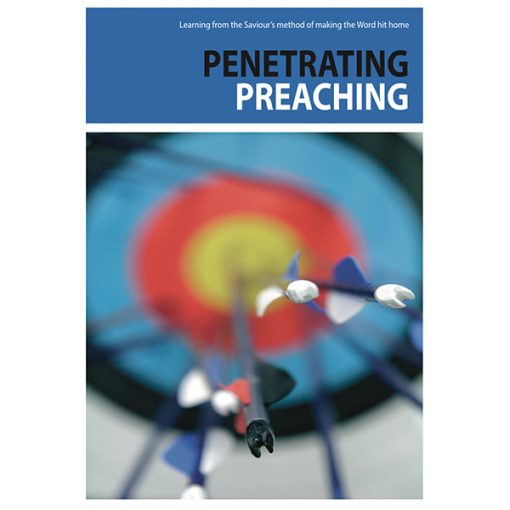Penetrating Preaching

Jun 30, 2016
 Reformation Scotland Trust was formed in 2013. Their stated aim is “to promote the restoration of the Christian Church in Scotland, by informing, educating and promoting understanding of the attainments of the Second Reformation in Scotland.” That is an aim that I’m sure many readers of Meet the Puritans would support. I encourage you to check out the Trust's attractive website and well-produced publications.
Reformation Scotland Trust was formed in 2013. Their stated aim is “to promote the restoration of the Christian Church in Scotland, by informing, educating and promoting understanding of the attainments of the Second Reformation in Scotland.” That is an aim that I’m sure many readers of Meet the Puritans would support. I encourage you to check out the Trust's attractive website and well-produced publications. Continuing on from the previous review of Reformation Scotland Trust’s publication, Family Worship: A Daily Guide to Reformation at Home, I’d like to highlight another of their works: Penetrating Preaching: Learning from the Saviour’s Method of Making the Word Hit Home.
Wanted: Penetrating Preaching?
But what is a booklet on Penetrating Preaching going to be about? Well, in essence it is a sustained defence and exposition of the exhortation of the Westminster Assembly’s Directory for Public Worship that the preacher:
is not to rest in general doctrine, although never so much cleared and confirmed, but to bring it home to special use, by application to his hearers: which albeit it prove a work of great difficulty to himself, requiring much prudence, zeal, and meditation, and to the natural and corrupt man will be very unpleasant; yet he is to endeavour to perform it in such a manner, that his auditors may feel the word of God to be quick and powerful, and a discerner of the thoughts and intents of the heart; and that, if any unbeliever or ignorant person be present, he may have the secrets of his heart made manifest, and give glory to God.
Those at the Westminster Assembly who wrote these words would agree with the sentiments of Richard Baxter, quoted at the start of the booklet, that “It would grieve one to the heart to hear what excellent doctrine some ministers have in hand, while yet they let it die in their hands for want of close [searching] and lively [living] application”.
This booklet’s burden is that Baxter’s warning is as much needed in our day as it is was in the 17th century. And therefore it aims to stir up preachers to apply the word of God to their hearers.
The Booklet
The booklet itself has six sections. There is an introduction, a reprint of a Banner of Truth magazine editorial by Maurice Roberts, and four extracts from the writings of outstanding Scottish theologian James Durham (1622-1658).
There is so much helpful material packed in to the 38 pages of this booklet that it would take many posts to cover them all. And so I just want to reflect on a few key statements, particularly those which counter the one main objection to application in preaching: that it is man centred rather than God centred, and that it fails to place the weight on the gospel that the New Testament does.
The first of these statement is that “the key focus of application for all preachers” should be “to bring sinners to Christ.” Application is not man centred, it is Christ centred. Application exposes sin, application lays bare hypocrisy and self-confidence. But is does that not as an end in itself but to present Christ as “the right remedy for their condition. That is himself, and his benefits and his imputed righteousness.” To have application is not to detract from Christ, rather it is ultimately point to him.
The second of these are the wise words of Maurice Roberts that “exhortation comes best on the back of doctrine. All the imperatives of the Christian life are based on the indicatives.” Nothing in this booklet contradicts this sense of the “grammar” of the New Testament. The application this booklet seeks to encourage in no way undermines the indicative/imperative force of the New Testament.
This the booklet, then, is Christ centred. That is especially clear in sections 4 and 6, which are extracts from Durham’s writings. All the exhortations presented to encourage more searching application in preaching are consistent with Durham’s conviction stated in section 6 that “any preaching which does not relate to Christ misses the mark and its text.”
Conclusion
Once again this booklet is beautifully produced and attractively set out. It deserves a wide readership, especially amongst those who “labour in the word and doctrine” (1 Tim. 5:17). One need not agree with everything (e.g. the caution about consecutive expository preaching) to find immense help here. There is indeed a crying need for more “searching” application and this book gives may wise and practical counsels on how to do that in a balanced and Christ exalting way.
Let me leave those who preach with one thought. Maurice Roberts states in this booklet that “A sermon is a thing of fire. A good sermon drips energy from the lips of the speaker.” Preachers, pray that your sermons would become “things of fire” which will touch and transform your hearers.
This post has been sponsored by the Reformation Scotland Trust.
This post has been sponsored by the Reformation Scotland Trust.





